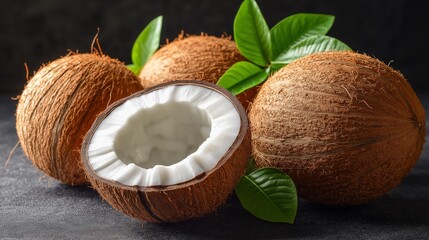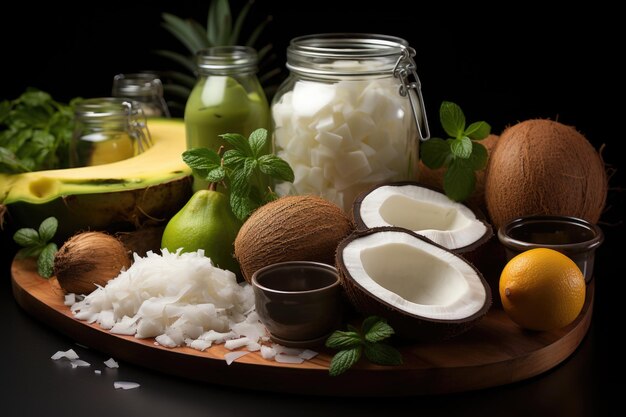Coconut oil is a natural oil extracted from the flesh of coconuts, primarily harvested in tropical regions. It has a high concentration of saturated fats, predominantly medium-chain triglycerides (MCTs), which give it distinct properties compared to other oils. Available in refined and unrefined (virgin) forms, coconut oil’s mild flavor and heat stability make it ideal for a range of cooking techniques.
Unrefined coconut oil retains its natural coconut aroma and flavor, while refined coconut oil has been processed to remove impurities, making it more neutral in taste and suitable for high-heat cooking.
Health Benefits of Coconut Oil
One of the most compelling reasons for coconut oil’s popularity in food is its array of health benefits. Let’s take a closer look at some of the key health advantages associated with incorporating coconut oil into your diet.
1. Supports Heart Health
Though coconut oil is high in saturated fats, the type of fats it contains—medium-chain triglycerides (MCTs)—are processed differently by the body compared to long-chain fatty acids. Research suggests that MCTs may help raise good HDL cholesterol levels, potentially promoting better heart health. However, moderation is key when consuming any type of fat.
2. Boosts Energy and Metabolism
MCTs in coconut oil are rapidly absorbed and converted into energy, providing a quick fuel source for the body. For individuals following low-carb or ketogenic diets, coconut oil is a preferred fat because it helps produce ketones, which the body uses for energy when carbohydrates are limited.
3. Enhances Brain Function
Coconut oil has been studied for its potential benefits in supporting brain health, particularly in neurodegenerative conditions like Alzheimer’s disease. The MCTs in coconut oil are converted into ketones, which may serve as an alternative energy source for brain cells, supporting cognitive function.
4. Antimicrobial Properties
Coconut oil contains lauric acid, which has antimicrobial and antibacterial properties. Lauric acid can help combat harmful bacteria, fungi, and viruses, potentially supporting immune function and promoting gut health.
5. Skin and Hair Health
While coconut oil is often applied topically for its moisturizing properties, consuming it in food can also have benefits for skin and hair. The oil’s fatty acids help nourish the body from the inside out, contributing to healthier, more hydrated skin and stronger hair.
A Versatile Ingredient Coconut Oil in Cooking
Coconut oil’s culinary versatility is one of its greatest strengths. Whether you’re frying, baking, or even blending it into smoothies, it offers unique benefits in each method. Here are some common ways to use coconut oil in your kitchen:
1. Sautéing and Stir-Frying
Coconut oil has a high smoke point (around 350°F for unrefined and up to 450°F for refined), making it an excellent choice for sautéing and stir-frying. It adds a subtle coconut flavor to dishes, which works particularly well in Asian and tropical-inspired recipes.
2. Baking
In baking, coconut oil can be a fantastic substitute for butter or other vegetable oils, especially in vegan or dairy-free recipes. Its solid state at room temperature makes it ideal for creating flaky pastries, pie crusts, and cookies.
3. Smoothies and Coffee
For an extra boost of energy and a creamy texture, add a spoonful of coconut oil to your smoothies or coffee. This is particularly popular in bulletproof coffee, a trend among people following ketogenic diets.
4. Raw Desserts
Thanks to its solidifying properties when cooled, coconut oil food is often used in raw desserts like energy bites, chocolates, and no-bake pies. When mixed with ingredients like cocoa powder and sweeteners, it creates a smooth, glossy texture perfect for indulgent treats.
Coconut Oil vs. Other Oils: How Does It Compare?
When deciding which oil to use in your cooking, it’s important to consider both the nutritional profile and the cooking properties of the oil. Here’s how coconut oil compares to some popular alternatives:
- Olive Oil: Olive oil is rich in monounsaturated fats and is known for its heart-healthy benefits. It’s best used for low-heat cooking or drizzling over salads, as its lower smoke point makes it less suitable for frying.
- Butter: Like coconut oil, butter is solid at room temperature and adds rich flavor to dishes. While butter contains long-chain fatty acids, coconut oil is predominantly MCTs, which may be more easily metabolized by the body.
- Vegetable Oil: Commonly used for deep frying, vegetable oil has a neutral flavor but is highly processed and contains omega-6 fatty acids, which can contribute to inflammation when consumed in excess. Coconut oil offers a more natural alternative with added health benefits.
- Avocado Oil: High in heart-healthy monounsaturated fats, avocado oil has a higher smoke point than coconut oil and is great for high-heat cooking. However, it lacks the unique flavor and antimicrobial properties that coconut oil provides.
Tips for Choosing and Storing Coconut Oil
Choosing the right coconut oil food for your cooking can depend on the type of dishes you’re preparing. Here are some tips to help you select and store your coconut oil effectively:
- Unrefined vs. Refined: If you want a strong coconut flavor, go for unrefined (virgin) coconut oil. For more neutral dishes, refined coconut oil is your best option.
- Organic and Cold-Pressed: Look for organic, cold-pressed varieties of coconut oil to ensure the highest quality. Cold-pressed oils retain more of their natural nutrients.
- Storage: Coconut oil is stable at room temperature, but to extend its shelf life, store it in a cool, dry place away from sunlight. It can last for up to two years if stored properly.
Incorporating Coconut Oil into a Healthy Diet
While coconut oil can offer a variety of health benefits, it’s important to consume it as part of a balanced diet. Here are some simple tips to help you incorporate coconut oil into your meals:
- Use it in moderation: Like all fats, coconut oil is calorie-dense, so it’s important to use it in moderation. A tablespoon in your cooking or smoothie can go a long way.
- Pair it with other healthy fats: Balance your intake of coconut oil with other sources of healthy fats, such as avocados, nuts, seeds, and olive oil.
- Experiment with flavors: Coconut oil pairs well with tropical and spicy dishes. Try using it in curries, coconut rice, or Caribbean-inspired recipes for a flavorful twist.
Conclusion
coconut oil food has earned its place in modern kitchens for good reason. Its unique flavor, versatility in cooking, and potential health benefits make it a valuable addition to any diet. From enhancing your morning coffee to sautéing vegetables or baking delicious treats, coconut oil offers a variety of ways to elevate both flavor and nutrition in your meals. By understanding its properties and how best to use it, you can incorporate coconut oil into your culinary repertoire and enjoy its benefits for both health and taste.
FAQs
Is coconut oil good for frying?
Yes, coconut oil’s high smoke point makes it a great choice for frying, especially refined coconut oil, which can withstand higher temperatures.
Can coconut oil help with weight loss?
Coconut oil’s MCTs are quickly metabolized and may help boost energy and promote fat burning, but it’s best consumed in moderation as part of a balanced diet.
Does coconut oil affect cholesterol levels?
Coconut oil may raise good HDL cholesterol, but it’s also high in saturated fats, so it’s important to use it wisely and not in excessive amounts.
What’s the difference between refined and unrefine coconut oil?
Unrefine coconut oil is minimally process and retains a strong coconut flavor and aroma, while refine coconut oil has been proces to remove impurities, making it neutral in flavor and better suit for high-heat cooking.
Can coconut oil be use in place of butter in baking?
Yes, coconut oil can be use as a dairy-free substitute for butter in most baking recipes, adding moisture and a subtle coconut flavor.
How do I store coconut oil?
Coconut oil is best store in a cool, dark place, away from direct sunlight. It remains solid at room temperature and has a shelf life of up to two years.


















